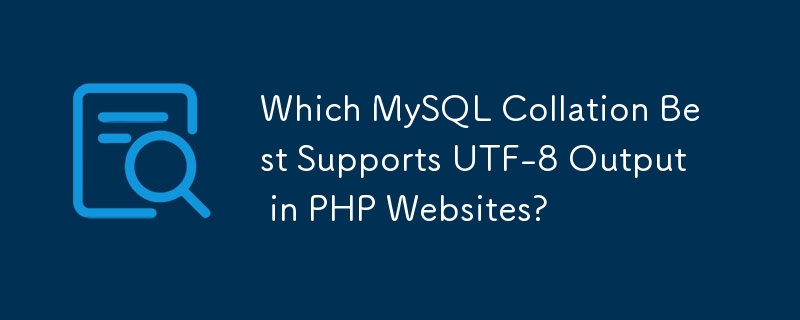

In the realm of website development, choosing an appropriate collation for your MySQL database is crucial when dealing with diverse character input. For general-purpose websites, selecting the most suitable collation can significantly impact user experience and data accuracy.
Regarding PHP output in "UTF-8," you may be wondering which MySQL collation corresponds to this encoding. MySQL offers several UTF-8 collations, each with its own strengths and considerations:
utf8_bin: This collation treats characters purely as binary data, making it less suitable for sorting or comparing characters.
utf8_general_ci: This collation prioritizes performance over sorting accuracy, using a case-insensitive and accent-insensitive approach.
utf8_unicode_ci: This collation offers improved sorting accuracy compared to utf8_general_ci but may result in performance overhead. Additionally, there are language-specific UTF-8 collations, e.g., utf8_swedish_ci, that consider language-specific sorting rules.
The optimal choice depends on the target audience of your website and the level of precision required for sorting. If precision is paramount and a specific language is used, a language-specific collation is recommended. For general-purpose websites where accuracy is less critical, utf8_general_ci may be a suitable option.
For further information on MySQL character sets, refer to the official documentation: http://dev.mysql.com/doc/refman/5.0/en/charset-unicode-sets.html.
The above is the detailed content of Which MySQL Collation Best Supports UTF-8 Output in PHP Websites?. For more information, please follow other related articles on the PHP Chinese website!
 What are the production methods of html5 animation production?
What are the production methods of html5 animation production?
 Three major characteristics of java
Three major characteristics of java
 jdk environment variable configuration
jdk environment variable configuration
 mstsc remote connection failed
mstsc remote connection failed
 What are the common management systems?
What are the common management systems?
 Solution to invalid signature
Solution to invalid signature
 What are the definitions of arrays?
What are the definitions of arrays?
 How to enter root privileges in linux
How to enter root privileges in linux




